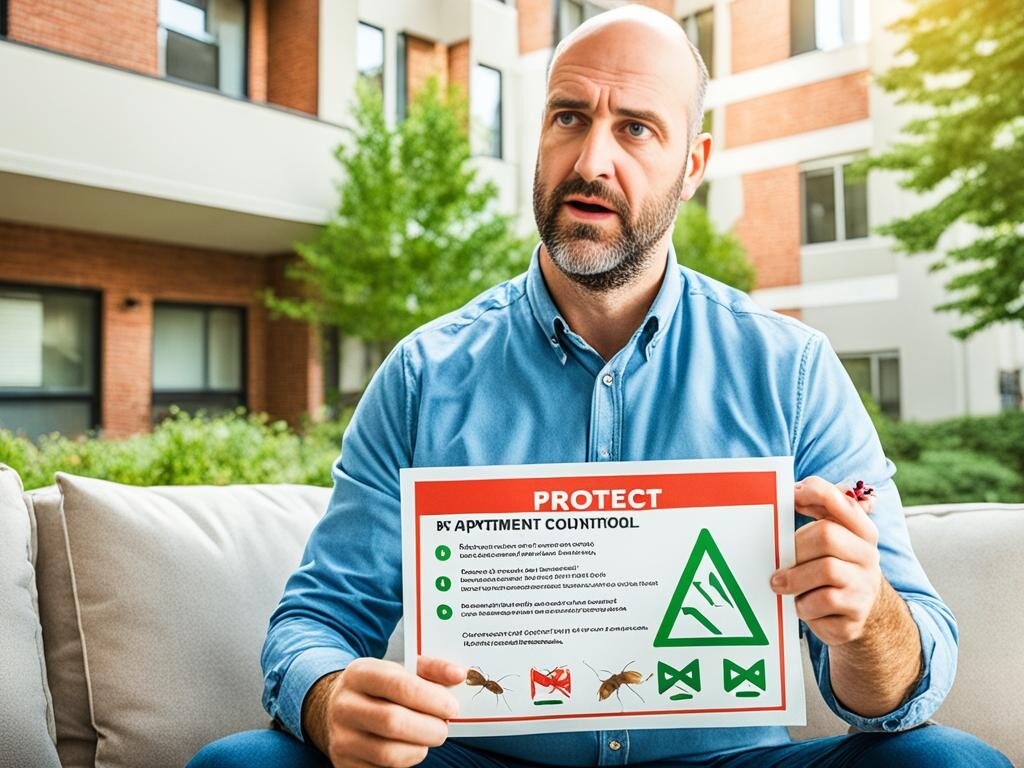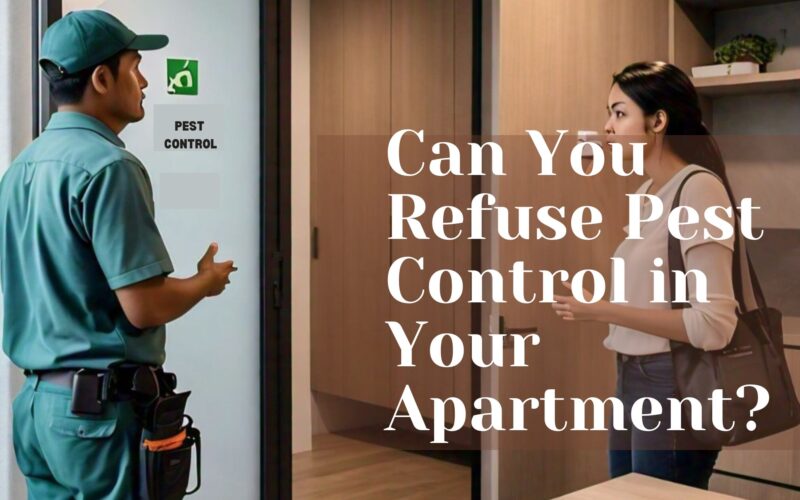Did you know over 50% of rental homes in the U.S. deal with pests yearly? As a tenant, you have the right to refuse pest control in your apartment. Your landlord must keep your place free of pests. But, you can’t just say no to pest control without good reasons and knowing your local laws.
If you have strong reasons, like severe allergies or pet safety, you might be able to find other ways to manage pests. But saying no because it’s a hassle won’t work. Landlords must keep your home safe and pest-free. Knowing your rights and duties regarding pest control in your rental is key.
Tenant Rights and Landlord Obligations for Pest Control
As a tenant, you have certain rights regarding pest control in your rental. Landlords must ensure your living space is safe and free from pests. They must inspect and treat for pests as needed.
Understanding Your Rights as a Tenant
In many states, landlords must fix pest issues quickly. For instance, in New York, they have 90 days for non-hazardous pests and 30 days for dangerous ones like bed bugs. They also have 21 days for rodents or cockroaches.
Landlords are seen as responsible for any new pest problems. They should call a pest control service right away if you report an issue.
Landlord’s Legal Duty to Maintain a Habitable Environment
The law says landlords must keep rental properties pest-free. This is for the health, safety, and well-being of the people living there. If a tenant causes a pest problem, the landlord can make them pay for pest control.
Landlords should keep records of past pest issues and how they were handled. This shows they meet their legal duties. If a tenant brings pests in, they might have to pay for the control costs, as stated in the lease.
Hiring a professional for pest control can cost between $175 and $3,000, says HomeAdvisor. Landlords usually spend a few hundred dollars monthly on pest prevention, like inspections and spraying.
Tenants can take steps under state laws if landlords don’t handle pests. This can include not paying rent or ending the lease without penalty.
Make sure to look over your lease agreement. It might cover pest control rules, legal duties, and tenant rights related to pests.
Reasons for Refusing Pest Control and Negotiating Alternatives
Landlords can usually decide on pest control in rental homes. But, tenants have good reasons to say no to certain treatments. Health issues, like severe allergies to pest control chemicals, or concerns about pets’ safety, are valid reasons. In these cases, tenants might negotiate for safer pest control options, like eco-friendly or non-chemical treatments.
Health Concerns and Allergies to Pest Control Chemicals
Some tenants can’t handle the chemicals used in pest control. This is a big concern. These chemicals can cause breathing problems, skin irritation, and other bad reactions. This is especially true for people with health issues or allergies.
Requesting Eco-Friendly or Non-Chemical Treatments
Tenants might ask for pest control that’s better for the planet and their health. These methods can fight pests without the health risks of chemicals. Options like using natural repellents and removing pests by hand can work well.
Talking to your landlord about your concerns is key. Try to find a solution that works for both of you. This way, you can keep pests away without harming your health or the environment.
Can I Refuse Pest Control In My Apartment

Dealing with apartment pest control can be complex, but knowing your rights is key. Landlords must keep living spaces safe and pest-free. Yet, you might be able to say no to some pest control methods under certain conditions.
Your right to refuse pest control depends on your local laws and specific situations. In Philadelphia, landlords must clear a property of pests before renting it out. They also handle infestations caused by property issues. But, tenants in single-family homes are usually in charge of pest control.
If you have health or safety worries about the pest control methods, you might negotiate with your landlord. In Philadelphia, rental properties must be safe and clean. This means your landlord could use eco-friendly or chemical-free options if you have good reasons.
But, just saying you don’t want pest control because it’s a hassle isn’t enough. Landlords still have to fix pest problems. You also need to keep your place clean and report pest issues quickly to stop them from getting worse.
Knowing your apartment pest control rights and tenant pest control responsibilities is crucial. By working with your landlord, you can find a way to deal with pests and respect your concerns.
Preparing for Pest Control in Your Rental Unit
Getting ready for pest control in rental properties is crucial. As a tenant, you’re key to making pest control work well. This means cleaning up and making sure exterminators can get to where they need to go.
Tidying Up and Clearing Access for Exterminators
Exterminators need to reach areas where pests hide and live. This includes kitchens, bathrooms, and places with moisture and food. To help them, clean your rental and remove any blocks. This means moving furniture, cleaning well, and putting food and pet stuff away.
Following Specific Instructions from Landlord or Pest Control Company
It’s also vital to follow any special instructions from your landlord or the pest control team. This could mean airing out the area, leaving the apartment for a bit, or doing other things. By doing this, you make the pest control treatment more effective and successful.
By getting your rental ready and working with pest control experts, you help get rid of pests. This makes your living space safer and healthier.
Conclusion
Knowing your rights and duties regarding pest control in your rental unit is key. Landlords must keep living spaces safe and free from pests. But, if you have health or safety worries, you can ask for other ways to handle pests.
Just saying no to pest control because it’s a hassle isn’t enough. You must talk with your landlord and look at your lease. Finding a solution that everyone agrees on is important. This way, tenants and landlords can keep the living area pest-free for all.
It’s vital to know your rights and what your landlord must do about apartment pest control. If you need different pest treatments or want your landlord to meet their duties, speak up. Being active and open can lead to a good outcome and a healthy, pest-free rental.
